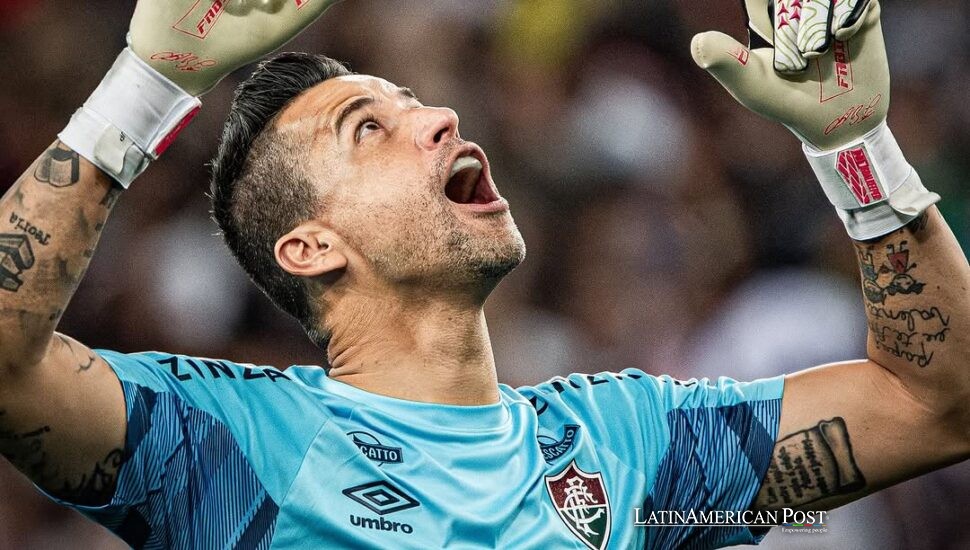Brazilian Ageless Wonder Fabio Makes Messi Look Fresh-Faced

At 44, Brazilian goalkeeper Fábio Deivson Lopes Maciel keeps rewriting football’s actuarial tables. When he starts in goal for Fluminense against Borussia Dortmund today, it will be the 1,375th senior competitive appearance of his career—within sight of Peter Shilton’s record and miles beyond ordinary notions of athletic shelf life.
From Paraná Dust to Belo Horizonte Granite
The first balls Fábio ever caught were made of rags, stitched by his grandmother on a back-porch bench in Ipiranga, a farming speck in Paraná state. União Bandeirante spotted the gangly teenager in 1997 and paid him with bus tickets and lunch vouchers. Seventeen seasons later, when Cruzeiro painted “O Muro Azul” across the Mineirão’s north stand, those same hands had already hoisted league trophies and Libertadores quarter-final clean sheets, yet people still whispered: He’s too quiet, too lovely, too loyal to leave.
Cruzeiro was never supposed to be forever. But after short stints at Vasco da Gama and Vitória, the blue of Belo Horizonte fit him like childhood skin. Over 976 appearances—each one logged in a weather-stained notebook kept by stadium doorman Seu Diego—Fábio became the club’s paternal constant. He survived ten coaches, three presidential coups, and the 2007 embarrassment when he turned away to protest a foul and Atlético Mineiro slid the ball into his empty net. That blunder turned the Mineirão into a coliseum of jeers for weeks. He answered by adding prayer meetings to his post-training routine and ended the season with the best save percentage in Brazil. “I learned a goalkeeper’s real job,” he later told Globo Esporte: “Put yesterday inside a box, lock it, and throw the key somewhere fear can’t reach.”
Rio’s Cathedral, a Pink Slip—and Resurrection
January 2022 should have been his testimonial. Cruzeiro was drowning in debt, mired in Série B, and Fábio flew to the training ground thinking he would ink a one-year extension. Instead, he was handed a release letter. He drove home silently, parked outside a Pentecostal chapel, and walked straight in without an appointment. “I asked God if He had misdialed,” he recalled to O Estado de Minas.
Phones vibrated before dusk. Fluminense, perched on the Rio coastline and hungry for maturity in goal, offered a contract that looked politely short—a mere two seasons. Fábio accepted, hauled his family to an apartment overlooking Copacabana, and by November was standing underneath confetti rain inside the Maracanã after turning away Boca Juniors to clinch the club’s first Copa Libertadores crown: six saves, two miracles, one new chapter.
Club psychologist Carla Diogo swears his impact was invisible and immediate: he sat beside young striker John Kennedy at breakfast and asked about his mother’s health; he organized extra video sessions for reserve keepers. “His presence is a thermostat,” she told the Folha de S. Paulo. The temperature rises, and Fábio absorbs it; the temperature drops, and he sparks it. No wonder the board quietly added two more years to his deal—carrying him through May 2026, his forty-sixth birthday.
Inside the Body That Betrays No Calendar
Sports scientists treat him like an eclipse—rare enough to justify odd theories. Neurologist Daniela Conde says his three-hour sleep cycles should trash recovery hormones; instead, bloodwork shows cortisol levels that are half the league average. Long-time physiotherapist Charles Costa claims Fábio’s REM windows are “short, ferocious, perfectly timed,” the biological equivalent of power napping through a red-eye flight and landing ready to sprint.
The weight room tells another story. While peers deadlift double their body mass, Fábio prefers push-ups on unstable discs and barefoot box hops. Heavy squats? “Too slow,” he shrugs. Deep-tissue massage? “I feel better without it.” The only surgical scar is a thin smile across his right knee from a 2012 meniscus tidy-up; surgeons noted cartilage “young as a 20-year-old.”
But ask teammates, and they cite mindset more than muscle. Goalkeeping coach Hércules Goulart recalls a 2023 Libertadores night when hotel fire alarms shrieked at 3 A.M. Players staggered to the lobby in boxers—except Fábio, who was already dressed, headphones on, replaying penalty footage on his tablet. “If I wake, I study,” he explained, then went out 18 hours later and saved two spot kicks.
Shilton’s Shadow, Record Books, and the Road Still Unfolding
Based on how statisticians parse friendlies and regional competitions, Peter Shilton finished at 1,387 or 1,390 professional appearances. Fábio’s Tuesday sortie against Borussia Dortmund will peg him at 1,375. Fluminense sporting director Fred jokes they’ll schedule a Maracanã fiesta “when even Shilton’s math agrees.” The Englishman, ever gracious, has already tweeted congratulations: “Landmarks are just benches on the trail—keep climbing, mate.”
Brazilian football writers see deeper meanings. Until Fábio, every member of the 1,000-games club was European. His pursuit spotlights South America’s overcrowded calendar—state leagues stacked atop national and continental tournaments—and the vanishing rarity of one-club stalwarts in an era of buy-low sell-early economics. Rodrigo Capelo of Placar argues that Fábio “redefined loyalty” by ignoring lucrative offers abroad during his prime. “He proved purpose can outbid currency.”
Tuesday in Arlington, Texas, another European titan will probe the Blue Wall. Jadon Sancho may flick heel passes, Niclas Füllkrug may thunder volleys, but somewhere near the penalty spot, Fábio will crouch, palms twitching, eyes toddler-bright. He insists he still feels pre-game butterflies; he just trained them to flap in formation.
Also Read: Mexican Passion Meets U.S. Immigration Wall Before 2026 World Cup
What about coaching, commentary, and retirement villas? He laughs at each suggestion. “I’ll sit when my body orders me,” he told The Athletic. And so far, the body, that miracle of joint grease and spiritual voltage, keeps whispering the simplest, most childish command: Play.




